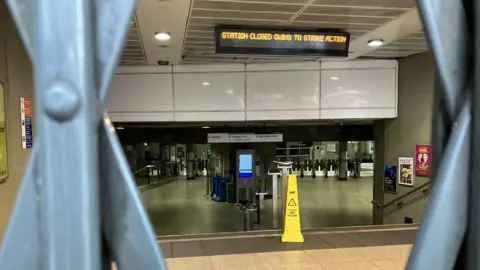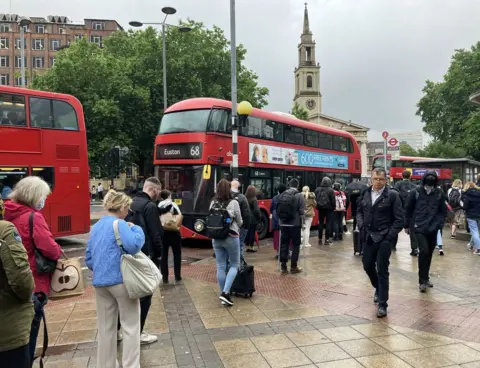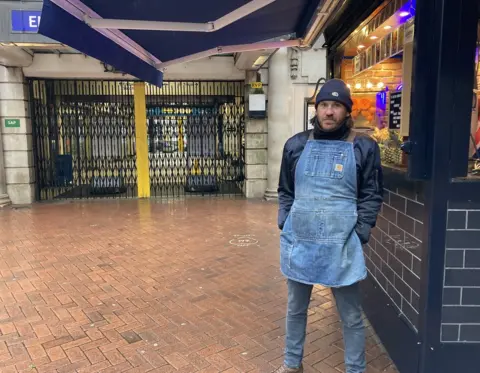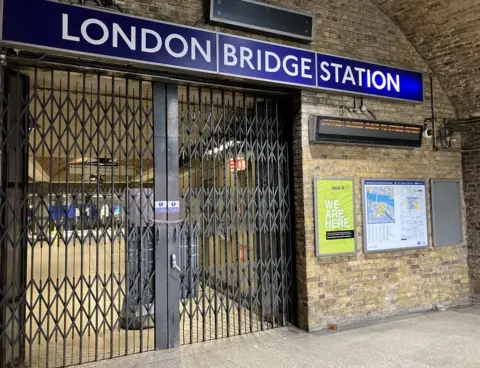Tube strikes: Do they work in the working from home age?

 BBC
BBCIt still takes some getting used to when Transport for London (TfL) - which relies on fares - asks commuters to work from home (WFH) if they can ahead of a Tube strike. So has working from home affected the dynamic of such industrial action?
Monday's strike wasn't a full walkout - it was staged by RMT-affiliated station staff - and so London Underground (LU) managed to run some services.
But while there were bus queues, it certainly felt much quieter than a usual strike day.
Many office workers can work flexibly and Mondays are the one that most chose to work from home. I'm told there were also a lot of inset days at schools.
So can new travel patterns negate the impact of strikes? Some people think they can.

Stephen Norris, the former Conservative mayoral candidate, sent me a message on Twitter.
He wrote: "We're all used to WFH these days. Rail/Tube disruption is much less damaging to the economy than it used to be. One for the RMT to ponder?
"Nobody's suggesting strikes don't impact. Sadly they do. But WFH definitely lessens their impact and over time more so."
Roger Evans, ex-deputy mayor for London, also posted: "Changes in working patterns were always more likely to break the rail union dominance than driverless trains (which still depend on other unionised staff) or no strike agreement (which they don't sign)."
Business groups still think strikes do cause significant damage, particularly to the centre of London.

Richard Burge, chief executive of the London Chamber of Commerce and Industry, said: "The last two years hit London disproportionately hard and the capital is desperately trying to claw back some sense of normality after a tumultuous two years.
"This strike now puts TfL in a position of having to recommend that Londoners work from home. Ultimately, this will only harm London's economy and it is time for TfL to sort out their dispute with the RMT so we can get back to building prosperity and showing the world that London is open business."
So while WFH can certainly negate the impact on some employees, strikes still affect footfall in the centre of London.
But does the level or type of disruption make a difference to unions calling a strike?
To answer that you have to look at what the unions' members want to achieve. Walkouts are the unions' strongest tactic. They get noticed and they get media coverage.
In this Tube dispute, RMT members want their pensions left alone and the plan to cut 600 posts to be dropped.
These were conditions imposed on TfL by central government as part of a bailout during the pandemic.
For the unions, it doesn't really matter what the level of disruption is - the crucial thing is whether it gets LU management to change their policy on pensions and post closures.
At the moment, after three strikes, that hasn't happened. No talks are planned at the moment.
In fact, as the pension review and the removal of posts are already part of a previous government bailout deal, it's very difficult to see how that can be resolved.
It is arguable whether it is even in TfL's gift to grant what the unions want.

Nick Bowes, the chief executive of the Centre for London, points out strikes could affect any future financial help from government.
He said: "The pandemic turned on its head people's traditional commuting patterns. A key legacy is that more people are working at home on Mondays and Fridays, so the pain of the Tube strike will have hit fewer people than would have been the case previously.
"Levels of use on London's public transport, while slowly increasing, are still down on what was seen pre-pandemic. Anything that contributes to lower levels of use, such as strikes, risks being jumped on by the Treasury as a further reason to demand cuts to services as part of any TfL bailout.
"The risk with this is it creates a downward spiral of demand, worsening the city's public transport network.
"With the centre of London still not back to the hustle and bustle seen in 2019, anything that reduces footfall will be looked on by businesses and the hospitality industry with real concern.
"There is still a long way to go to get back to the levels of activity central London was accustomed to prior to the pandemic."
Of course there can also be a political element in strikes. In some disputes there can also be inter-union rivalry.
Broadly, left-wing unions and right-wing governments are not the most comfortable of bedfellows.
And as one transport boss said to me about the current situation: "It's all getting very political and we are stuck in the middle."
So can WFH reduce the impact of Tube strikes? Probably a bit - but businesses in the centre of town still suffer.
Will it change unions using it as a tactic? No.

Follow BBC London on Facebook, Twitter and Instagram. Send your story ideas to [email protected]
